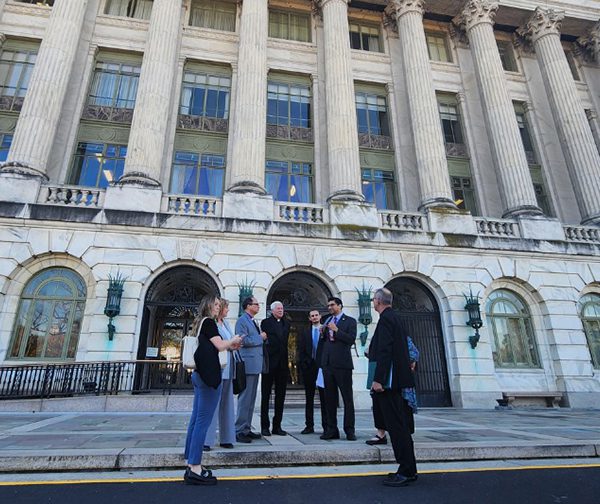“The witness of this church in society flows from its identity as a community that lives from and for the gospel. Faith is active in love; love calls for justice in the relationships and structures of society. It is in grateful response to God’s grace in Jesus Christ that this church carries out its responsibility for the well-being of society and the environment.” The Church in Society: A Lutheran Perspective, 1991
As members of the ELCA, we believe that we are freed in Christ to serve and love our neighbor. God uses our hands, through our direct service work and our voices, through our advocacy efforts, to restore and reconcile our world. Through faithful advocacy, the ELCA lives out our Lutheran belief that governments can help advance the common good.
ELCA advocacy works for change in public policy based on the experience of Lutheran ministries, programs and projects around the world and in communities across the United States. We work through political channels on behalf of the following biblical values: peacemaking, hospitality to strangers, care for creation, and concern for people living in poverty and struggling with hunger and disease.
ELCA Washington Office works for change in public policy at the federal level, based on the experiences of Lutheran ministries and projects around the world and in communities across the U.S.
- To sign up for the national e-Advocacy network and receive federal legislative updates and alerts, click here
- Like” ELCA Advocacy on Facebook at “ELCA Advocacy”
- Follow ELCA Advocacy on Twitter at @ELCAadvocacy www.twitter.com/ELCAadvocacy
- Visit the ELCA Advocacy Blog.
The ELCA Washington Office (D.C.) fulfills the Evangelical Lutheran Church in America’s witness for social justice on domestic and foreign policy issues facing the nation, and through it, the world. With a commitment to a prophetic vision which stands with the poor and the powerless, the office represents the church’s positions within the complex arena of public debate. To achieve effective interaction between the whole church and the federal government, the office educates, informs and enables full involvement of the church in this ministry.

State Public Policy Offices represent the church in advocating at the state level with and on behalf of those without economic or political power. They work in partnership with local congregations, synods and social ministry organizations.
Lutheran Office for World Community represents the Evangelical Lutheran Church in America and The Lutheran World Federation (LWF) at the United Nations (UN) headquarters in New York. The LWF is a non-governmental organization officially recognized by the UN’s Economic and Social Council. Visit the website.
The Corporate Social Responsibility program of the ELCA seeks to enter into dialogue with business representatives on the social implications of company practices and to affect ELCA investment policy in socially responsible ways. It defines it’s work in the following manner:
Social Criteria Investment Screens
Social criteria investment screens provide a guide for this church with regard to corporate social responsibility. They delineate areas in which the ELCA would like to invest or refrain from investing and provide criteria to evaluate the scope of the work. The objective of social criteria investment screens is to identify the dimensions of a given problem area, and within those dimensions to focus on egregious problems that are most critical to address. All social criteria investment screens have the overall objective of addressing the ELCA’s concern for the social, environmental, and economic sustainability of corporations.
Social criteria investment screens do not constitute binding mandates or provide, for example, specific lists of corporations. It is the responsibility of the ELCA and each ELCA-related organization and individual Lutherans to develop and manage a prudent and responsible investment portfolio. The ELCA social criteria investment screens offer a context for decision-making about socially responsible investments.
Boycotts and Divestment
The ELCA has a specific and restrictive procedure concerning any possible boycott. A boycott has been defined as a collective effort to abstain from the purchase or use of products or services provided by a targeted firm, government, or other agency. The purpose of a boycott is to persuade the targeted entity to cease certain practices judged to be unjust, and/or to perform certain practices deemed to be just.
Boycotts in the faith community have been taken both against an individual company — such as the Nestlé infant formula boycott which began in the 1970s — or an industry such as the lettuce boycott of the 1980s. Boycotts only work if there is an economic impact and media coverage. The ELCA’s procedure concerning a boycott is detailed and therefore would likely take some time to be considered.
Sanctions
Another topic much discussed is sanctions. These are sometimes defined as punitive or restrictive measures taken, usually by several countries in concert, to pressure a country to change its certain policies. The 1995 ELCA social statement, For Peace in God’s World, states that:
“In support for just political structures, we … acknowledge that the responsible use of sanctions may on occasion be the most effective and least harmful measure to lead states to stop oppressing their people ….”
Corporate Social Responsibility resources may be found here.





